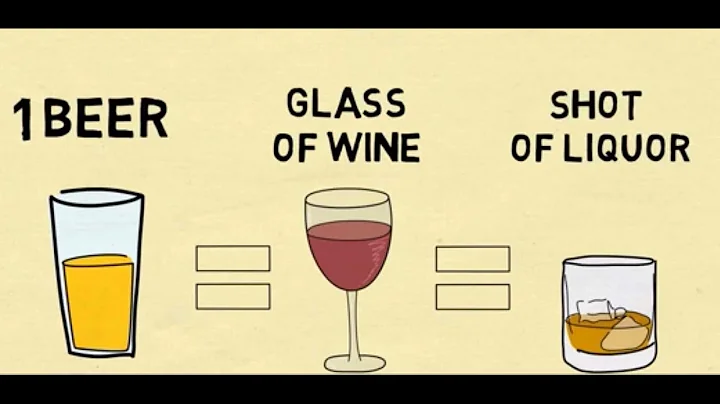For some people, summer happiness is always indispensable with the blessing of beer. Whether you're hanging out with friends on the street or watching a football match alone, sparkling beer can always fill the atmosphere.
However, this alcoholic beverage you often drink not only makes you fatter as you drink more, but may also accelerate brain aging.

combined research and interviews with experts to reveal why beer causes brain aging and teach you how to drink in moderation.
Interviewed expert
Department of Clinical Nutrition, Renji Hospital Affiliated to Shanghai Jiao Tong University School of Medicine Nutritionist Tang Molian
Ning Weixia, deputy chief physician of Chengdu Second People's Hospital
A bottle of beer a day, the brain will advance Aging
Recently, the United States A study published by a research team at the University of Pennsylvania in Nature Communications shows that long-term drinking is related to reduced brain capacity. On average, one bottle of beer per day can cause approximately 100% damage to the brain. It is equivalent to accelerated aging by two years.

The study used data from 36,678 healthy adults aged 40 to 69 years old in the British Biobank as an analysis sample. In order to understand the potential relationship between drinking and the brain, the researchers controlled for complex variables that may affect this relationship, such as participant age, height , handedness, gender, body mass index, smoking, financial status, genetic information and place of residence.

At the same time, they also corrected the participants' brain volume data. Participants answered the survey about the number of units of alcohol (including wine, champagne, beer, cider , spirits, etc.) they consumed per week or month. research found that:
- Alcohol intake is negatively correlated with brain volume, gray matter (nerve center, plays a controlling role) volume and white matter (mainly plays a conductive role) microstructure.
- As the amount of alcohol consumed increases, the volume of gray and white matter in the brain decreases, which means that the greater the amount of alcohol consumed, the faster the brain ages.
- Even light to moderate drinking (1 to 2 drinks per day) can cause damage to the brain.
Among them, the alcohol unit used in the study is: 1 alcohol unit corresponds to 10 ml of pure alcohol. A bottle of beer (approximately 440ml) is 2 units of alcohol, a single 25ml glass of spirit is 1 unit and a standard 175ml glass of wine is 2 units.
Research results show that compared with people who do not drink:
- Drinking an average of 1 alcohol unit (half a bottle of beer) per day is equivalent to half a year of brain aging;
- Drinking an average of 2 alcohol units (1 bottle of beer) per day is equivalent to brain aging. 2 years of aging;
- 3 units of alcohol (one and a half bottles of beer) per day, equivalent to 3.5 years of brain aging;
- 4 units of alcohol (2 bottles of beer) per day, the degree of brain aging exceeds 10 years.
html It takes 14 hours to metabolize a bottle of beer.
The harm of regular drinking of beer is far more than premature aging of the brain. It may also make you gain weight as you drink more. Some people think that the alcohol content of beer is not high, so they drink it openly.
In fact, beer is known as liquid bread. In addition to alcohol, its main ingredients include sugar, protein, and a small amount of water-soluble B vitamins and minerals. A bottle of 500ml beer with 4 degrees Celsius contains the equivalent of 35 grams of sugar.
A survey shows that canned beer has about 155 kilocalories, while canned fruit beer has about 130 to 140 kilocalories per can, which is equivalent to half a bowl of white rice.
Although the calories of alcohol can only be burned to produce heat and are not directly converted into fat, because the heat generated by alcohol saves the calories of other nutrients, it can still indirectly lead to obesity.

For the average person, it takes about 4 hours on average for the body to metabolize a bottle of beer containing 20 grams of alcohol and 500 ml. If you drink two bottles of beer, the body needs 8 hours to metabolize, and you can basically recover after sleeping for a night. However, this standard also depends on 4 factors:
- Physical constitution: Alcohol metabolism in the body requires decomposing enzyme . If the body lacks this Enzyme, wine is not only difficult to digest, but also makes you drunk as soon as you drink it.
- Drinking amount: If you drink too much, even if there are many hangover enzymes in your body, it will be difficult to metabolize the alcohol for a while, and you will easily get drunk. Especially if you drink on an empty stomach, the alcohol is absorbed quickly and makes you more likely to get drunk.
- Drinking time: If you drink all night long, from dinner to the early morning of the next day, it will be difficult to completely metabolize alcohol even if you sleep.
- Gender: Women's livers are small and affected by hormones, so their ability to relieve hangovers is lower.
Understand the two numbers on the beer label
Beer is brewed from malt and water, adding hops and fermented by yeast . The malt must be roasted before brewing. The malt is roasted to different degrees, resulting in beers of different colors.

- yellow beer: the most common type of , with a light and mellow taste and a strong hop aroma.
- Dark beer : has a strong taste, strong taste, dark color, strong bitterness and malt taste, and the aroma of coffee and toast is left after careful aftertaste.
- Red beer: tastes different. For example, Irish red ale has a slight sweetness, accompanied by a bitter taste similar to tea, and the wine body is soft and smooth; Flanders red ale has a unique and refreshing taste. , and the fruit acid and lactic acid produced during the post-ripening process also give it a unique sour taste.
- white beer: has rich foam, soft and refreshing taste, light and clear, and the aroma of hops is also more prominent.
No matter what kind of beer, there are two important numbers on the label:
Alcohol content
is generally marked by volume percentage, such as 3.4%vol, which means that every 100ml of beer contains 3.4ml of pure alcohol.
Original wort concentration
refers to the grams of sugar in 100 grams of wort, expressed in °P. For example, 10°P means that the sugar content in 100 grams of wort is 10 grams.
It is generally recommended that men drink less than 2500 ml/alcohol, and women drink less than 1500 ml/alcohol.
For example, if the alcohol content of beer is 5%vol, then men should not exceed 500ml/day and women should not exceed 300ml/day.
It should be noted that people with gout, kidney disease, urinary system stones, diabetes, liver disease, cardiovascular disease, gastritis, gastric ulcer and other diseases should not drink beer.





















